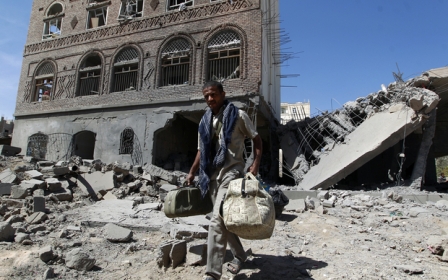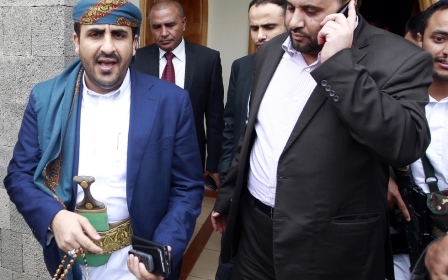Yemen government quits talks after Houthis reject deal

Yemen's government delegation to peace talks has decided to leave Kuwait on Monday after the Houthis rejected a draft peace plan proposed by the United Nations, a spokesman said.
"We are leaving today after having completed our part in the talks," spokesman Mohammed al-Emrani told AFP.
"The ball is now in the rebels' court," he said.
The delegation is returning to Riyadh after informing UN special envoy Ismail Ould Cheikh Ahmed that it was ready to sign the proposed peace plan which the Houthis rejected, Emrani said.
The Houthis and their key ally, former president Ali Abdullah Saleh, rejected the peace plan on Sunday, saying it was incomplete.
"The other party now has the key to make the talks fail or succeed... If they agree to the plan, our delegation will return," Emrani said.
The government delegation's decision to leave host country Kuwait came after a meeting with UN Yemen envoy Ould Cheikh Ahmed.
According to the government, the draft plan calls for the rebels to withdraw from the capital Sanaa and two major cities, hand over heavy arms and return state institutions they seized in September 2014.
The rebels said that first a national unity government must be formed and a new consensus president appointed to oversee the transition.
Yemen, home to what the United States sees as al-Qaeda's deadliest franchise, descended into chaos after the 2012 overthrow of longtime strongman Saleh.
Security deteriorated further after the Houthis swept into Sanaa and pushed south, forcing President Abd Rabbo Hadi's government to flee into exile in March last year.
The United Nations says the conflict has killed more than 6,400 people and displaced 2.8 million since March, when a Saudi-led Arab coalition launched a military campaign in support of Hadi.
New MEE newsletter: Jerusalem Dispatch
Sign up to get the latest insights and analysis on Israel-Palestine, alongside Turkey Unpacked and other MEE newsletters
Middle East Eye delivers independent and unrivalled coverage and analysis of the Middle East, North Africa and beyond. To learn more about republishing this content and the associated fees, please fill out this form. More about MEE can be found here.




